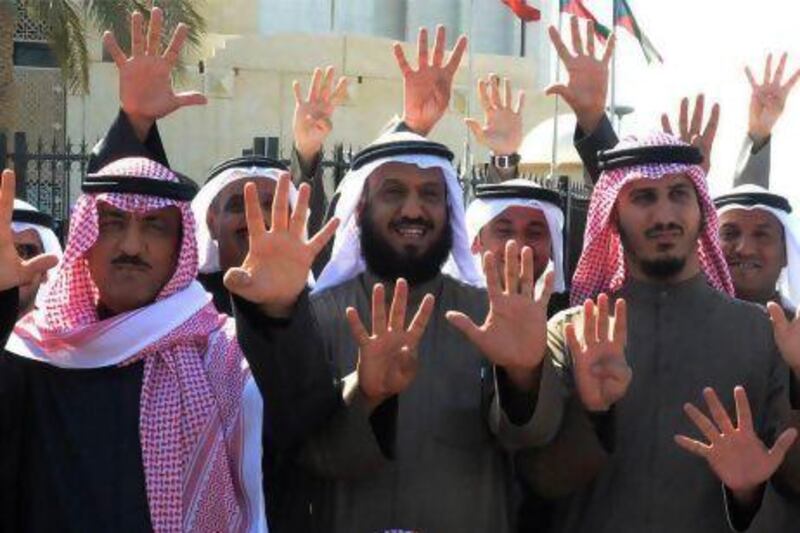KUWAIT CITY // When a judge refused to call the Kuwaiti prime minister as a witness this week, the lawyers defending opposition leader Musallam Al Barrak walked out of court.
Mr Al Barrak, a former MP and arguably the opposition's most popular figure, is accused of insulting the country's Emir during a speech at an October rally. His defence sought to call the former head of government and former opposition MPs to testify in his case. Their request denied, they protested and left their client without a lawyer on Monday. Judge Wael Al Atiqi pushed back the verdict to April 15.
It was not the first time that Mr Al Barrak, 57, has caused a stir. During past hearings, his supporters have held impromptu rallies in the parking lot. New security barricades block sections of the hallway, limiting his gaggle of supporters to a mere dozen or two.
After months of gathering on the streets to protest, in public squares to rally, and in private homes to debate, these days Kuwait's opposition is more often found here, in court. Activists estimate that more than 600 people are facing charges related to protesting and political organizing. Most of the charges, such as illegal gathering or unlicensed demonstration, carry jail times between a few months and several years.
But the slew of court cases has had a chilling effect on an opposition movement that just months ago brought tens of thousands of supporters to the streets.
Many of activists who once organised protests via Twitter now spend their time drafting legal briefs.
While cases such as Mr Al Barrak's have galvanised the opposition's base, the threat of legal action has deterred many Kuwaitis from protesting again.
"It's making the opposition tired, it weakens them," said Abdulrahman Al Ansari, a lawyer who is defending several activists. "They have to focus on the cases only, not on the political situation."
The prospect of "hard jail terms makes people afraid", he added.
The lull in opposition activity is a break from the past year, during which Kuwait's opposition had gained momentum.
Early last year, parliament had grown more brazen in its critique of the government, which is appointed by the emir. Friction came to a head in February 2012, when parliamentary elections installed an opposition-dominated National Assembly.
In June, however, the Constitutional Court annulled the parliament on a legal technicality. The emir, Sheikh Sabah Al Ahmad Al Jaber Al Sabah, called fresh elections, but not before changing the electoral system in a bid to prevent future court cancellations.
Before, each Kuwaiti could select up to four candidates in their district, a system that promoted coalition building. Under the new rules, each person has one vote.
The opposition objected to the electoral change, which was undertaken while parliament was out of session, as an overreach of the emir's authority. They boycotted the December 1 parliamentary election in protest. For weeks surrounding the vote, hundreds of thousands of people took part in protests in Kuwait City.
Many of the court cases now pending against activists stem from those rallies.
"Every day you see new cases on Twitter that you didn't know about before," said Monther Al Habib, a member of a newly formed youth group, the National Committee for Monitoring Violations. The committee has created a schedule of pending trials to help monitor the judgements.
Mr Al Barrak, who says the charges against him are political, insists his case and others can only backfire for the government.
"The government is abusing the law," he said before a March court appearance. "It's very clear, by [the fact that they are] chasing the youth and the ex-MPs and taking them to court."
The supporters gathered at Mr Al Barrak's hearings agree that the case has reinvogareted them. Opposition protests were planned to contest Mr Al Barrak's trial late yesterday evening and again this Saturday.
"This is not democracy, because anyone who talks, they put him in jail," said Abbas Asshabi, 62, who has been perpetual presence at opposition events. He attended nearly every session the opposition-dominated 50-member parliament, earning the nickname "the 51st MP".
But the less devoted are thinking twice, and the cases are also testing the cohesion of the opposition that, at its peak, encompassed youth, tribalists, Islamists and liberals.
That coalition has begun to break into its constituent parts. In the past month, two large opposition blocs have proclaimed themselves separate, though they have vowed to cooperate.
Etilaf, the larger bloc, encompasses trade unions, youth groups and moderate Islamist MPs and has called for full elected government. A smaller, Salafi-dominated group calling itself Tensiqiya calls for more modest reforms. Individual personalities are also heading separate ways, taking their followers with them.
Some in the opposition believe the divisions are a sign of growth.
"As we get closer to the target [of a parliamentary government], we will see people coming out, looking for exits," said Tariq Al Mutairi, head of the youth Movement for Democratic Change, which is a member of Etilaf. "We can't take someone who is half-half [on change]."
Mr Al Mutairi and his peers are now pinning their hopes on another court case. Next month, the Constitutional Court will give its decision on the legality of last year's changes to the electoral system. If the system is found to be unconstitutional, parliament will be dissolved and another round of elections will be held.
edickinson@thenational.ae
* With additional reporting by Agence France-Presse





